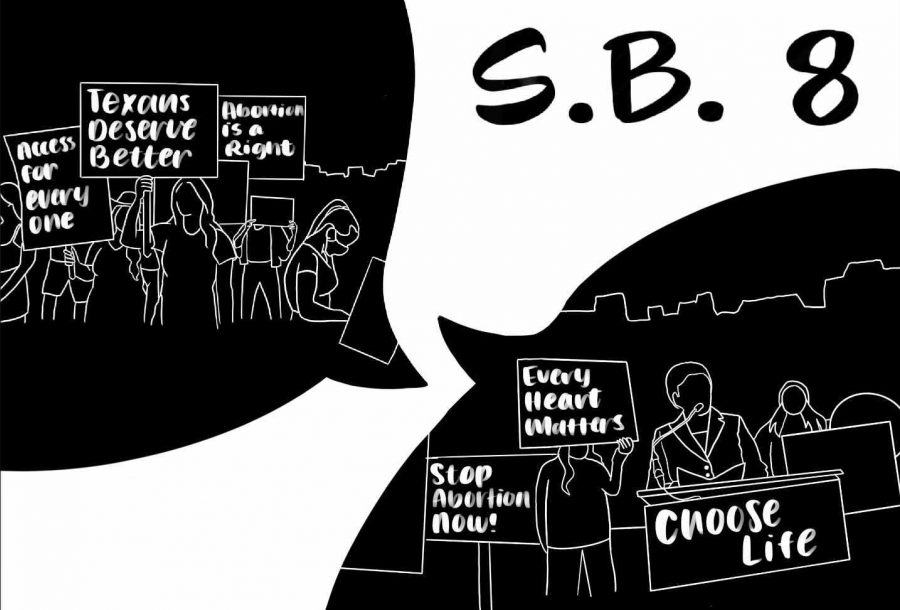“Frick yeah, man”: Westwood students respond to Senate Bill 8
Texas Senate Bill 8 was passed on Wednesday, Sept. 1. This past week, the Horizon surveyed Westwood students about their opinions regarding the bill.
September 15, 2021
This story contains sensitive comments which may be upsetting to some readers.
Prior to this year, the legal definition of what constitutes a living human being with protected rights was a much contested topic in Texas. The state has a long and complicated history with abortion law which began in 1900, at which time the practice was illegal, though exceptions were put in place in the following decades. Over the next 100 years, a clash between federal, state, and local law ensued, finally culminating in the enactment of Texas Senate Bill 8 on Wednesday, Sept. 1.
The “Heartbeat Bill” is the first six-week abortion ban to go into affect in the United States, and relies on civilian lawsuits to enforce the ban, rather than the state. The act hinges on the concept of the fetal heartbeat, which can be detected at six weeks, though many abortion providers and health professionals assert that the term is inaccurate as an embryo doesn’t actually have a developed heart at six weeks (the “heartbeat” detected is actually cellular electrical activity).
Texans, Americans, and international news organizations have certainly had much to say about the landmark legislation, but this past week, The Horizon surveyed Westwood students to collect some opinions a little closer to home. The survey included four questions: Whether or not students agreed with the law and why, their initial responses to hearing that it had passed, if they knew anyone affected by the law, and what they would say to those who were responsible for the law, given the chance.
Of the 2,789 students enrolled at Westwood this year, 160 responded to the survey during the two-day period the form was accepting responses. Of those, 131 disagreed with SB 8, while 24 agreed with the law and 5 remained undecided. Given the limited scope of the survey, the responses are by no means a complete representation of the student body as many students don’t check their email (where the survey was sent), and others may have been hesitant to share their opinions, even despite the anonymity factor.
The responses, to use a cliché phrase, were an emotional rollercoaster. Anger, exuberance (“WAHOOOOOOOO!!!!!,” one student wrote) and apathy were all present. “I agree with SB8 solely because it is funny to watch people having meltdowns over it,” read one, and in another in opposition: “I might throw something just thinking about this bill. Just trying to craft my response I feel like I’m about to cry.”
When asked if they knew anyone impacted by the bill, the answers usually fell into one of three categories: Either a simple “no”, from those who both agreed and disagreed with the law, or “every woman”, an answer only from those who disagreed (“R u frl?,” One student asked. “We are all affected.”) Other students responded with personal stories.
“My sister has been affected by SB 8 because she had to make the difficult decision to abort her pregnancy earlier this year because she is not mentally or financially stable to bring a child into the world,” an anonymous student said. “The passing of the bill has brought up those past emotions because if her situation happened now she would have been forced to carry the baby to term, pay any and all medical bills, deal with her severe depression and [bipolar disorder] whilst pregnant, and [have] to work and study full-time to take care of herself and a child.”
Other students chose to be concise.
“If you don’t want a baby dont have sex. [It’s] that simple,” one student said.
Consent, rape, sexual assault, and bodily autonomy were topics that appeared multiple times in student responses (SB 8 doesn’t include an exception for rape and incest cases, but Governor Greg Abbott vowed at a press conference to “eliminate” the sources of those problems).
“My 18-year-old brother raped [my] 13-year-old sister. [She] did not understand pregnancy and what not but was old enough to get pregnant and because of this bill if she was to in fact get impregnated my brother could sue her for $10,000 at minimum for ‘damages’. My father is seriously considering moving us as soon as she agrees to it due to the fact I have already been raped by two different men in my life and her one,” an anonymous student said. “I’m 15 years old and [I am not ready to have a child]. I have the right to have a choice on what happens to my body and [due] to the fact that consenting to sex is not always a choice nowadays I should at least have a choice to abort a child living inside ME.”
And while some students believed that the right of bodily autonomy in an abortion case belongs to the person carrying the embryo, others thought the opposite.
“Whether or not you believe the baby is a ‘clump of cells’, that ‘clump of cells’ will grow to become a child. Whether or not you believe that the child will live a terrible life, does not justify stopping their chance at life. Whether or not you believe that people shouldn’t ‘control women’s bodies’, the real body that is being controlled is the child’s body,” one respondent wrote.
While some states do have six week abortion bans in litigation, Texas is the only state to deputize civilians as enforcers of the law, and to hold liable all those who enable the abortion, including Uber and Lyft drivers (though the two companies have both said they will pay driver’s legal fees if they are sued under the new law.)
“I agree with the senate bill SB 8 because of the way that it is enforced. I personally believe that a heartbeat is an indicator of life and abortions after the heartbeat are murder,” a student said, adding: “I think the enforcement of this bill is done especially well as the burden is put on the provider of the service only in the cases where damage was done.”
Other students responded incredulously to the “stupid” way the legislature decided to enforce the law.
“An Uber driver can get sued for driving a pregnant person to the hospital, not even knowing the person at all, or why they are going to the hospital. This law is against our rights as a sentient human being and promotes harm to oneself,” one student wrote.
“It also is dangerous for a number of other people who may or may not know they’re involved in breaking the law (i.e. taxi drivers, doctors, etc.),” another student agreed. “This bill was passed with the justification of being ‘pro-life’. However, that is not the main motive, and even so the bill really is pro-birth. If it was actually pro-life, it may include provisions such as Medicare for all, free college, and perhaps even a UBI because, let’s face it, many people getting abortions aren’t always financially stable.”
Many other students echoed that sentiment, pointing out a perceived unwillingness by the government to care for children after they are born as the reason for their opposition to SB 8.
“Pro-lifers don’t care about lives, they care about controlling people with uteruses. The second that baby comes out poor, or gay, or Black, they don’t care about [its] quality of life whatsoever,” an anonymous student said.
Repeatedly, among those who disagreed with the bill, the image of a controlling “old man” was referred to in the responses.
“Politicians don’t care about children. They care about power, and this is a move at keeping the power in the hands of the old white man,” one anonymous student said. “I don’t care what an old man thinks about abortions so why should those opinions affect me,” said another. “We are all women who do not need old men saying s***.” (SB 8 had 91 sponsors. Out of the 21 primary sponsors, 14 were men.)
While most of the responses were heavily in agreement with either one side or the other (“[My response to the law being passed was] laughing at lunatics that have no [morals] on Instagram thinking killing babies is cool, instant joy,” versus “THIS IS STUPID!”), some were less swayed to one particular side of the conversation.
“For the most part, I believe that it is a good thing. I don’t think anyone can say that abortion is a good thing — you can say that it may infringe on a woman’s rights — (and I wouldn’t argue with you), but it is certainly not healthy or decently moral in any way. You are killing something that will become a human being. However, it is important to look into both sides and all our knowledge is always limited, so it would be foolish to have an opinion on something if you are limited to only one point of view,” an anonymous student said. “I am not a woman and neither am I affected by this bill, so my view becomes even more limited in this way.”
One particularly creative student decided to forgo a written answer when asked what their response to the bill being passed was and instead responded with a link to the scene from the film Diary of a Wimpy Kid: Rodrick Rules, in which Rodrick apologizes to the entire female gender: “I’m sorry, women”.
Not all had the same sense of humor, though. “I cried. I broke down crying,” one student said. “[I felt] pure unrelenting rage,” another said. “[I] wasn’t surprised,” another conceded. “All men have is audacity.”
The final part of the survey was student messages to lawmakers. (One student took issue with the question itself, saying: “Btw it is SO clear that the writers of this google form are against [the law]. The question about writing to lawmakers is absurd. [People would only] write to them if they wanted change. If you’re going to put up a form, at least act like you’re neutral.”)
[If I could speak to those who passed the law I would say] “Thank you, but ban it completely!,” one student wrote. “Thank you for your service, I’m so glad you’re protecting the life of the unborn,” another wrote. Other students responded conversely, saying, “Your disregard for the freedoms of women disgust[s] me, and the fact that a seventeen year old girl has the capacity to see why this bill is abominable and YOU don’t is beyond me. You should be ashamed and feel pathetic.”
Indifference was also present in student responses: “I would like to tell them that they have performed admirably in the art of annoying the most possible people at once.”
“Abbott is trying to make the liberal voters disgusted and leave Texas so Republicans can consolidate their power,” a student said. “I see what y’all are up to.”



